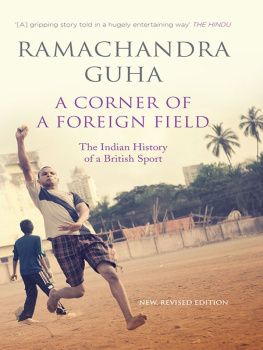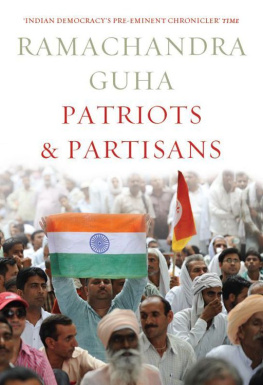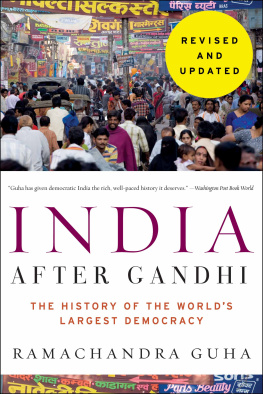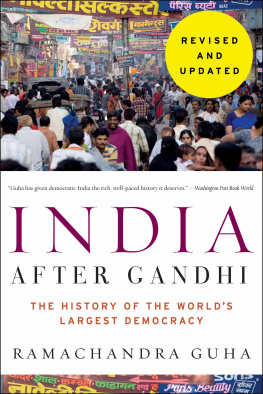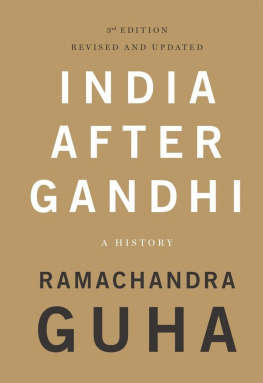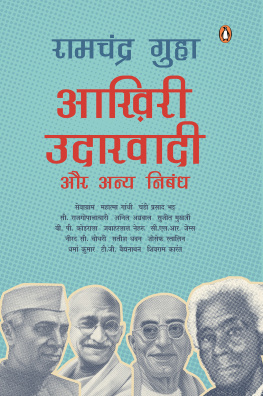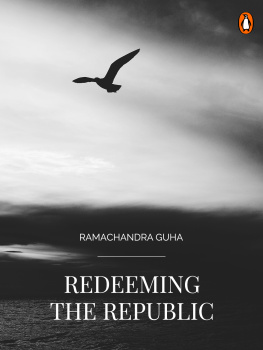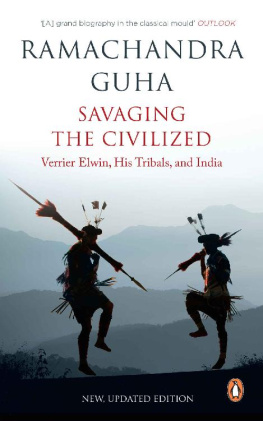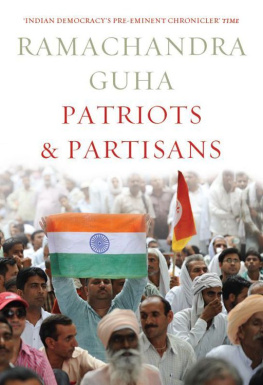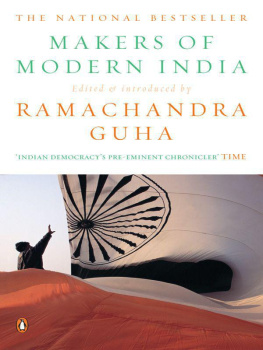Ramachandra Guha
Verdicts on Nehru: The Rise and Fall of A Reputation
Contents
About the Author
Born and raised in Dehradun, Ramachandra Guha studied at the Delhi School of Economics and at the Indian Institute of Management, Kolkata, where he wrote a doctoral dissertation on the Chipko movement. He has pioneered three distinct fields of historical inquiry: environmental history (as in The Unquiet Woods, 1989), the social history of sport (A Corner of a Foreign Field, 2002), and contemporary history (India After Gandhi, 2007). He is also the author of Savaging the Civilized: Verrier Elwin, His Tribals, and India (1999), which is soon to appear in a new edition from Penguin.
Guhas awards include the Leopold-Hidy Prize of the American Society for Environmental History, the UK Cricket Society Prize, the Malcolm Adiseshiah Prize for excellence in social science research, the Sahitya Akademi Award, and the Padma Bhushan. His books and essays have been translated into more than twenty languages.
On the Occasion of Jawahar Lal Nehrus 50th Death Anniversary
Verdicts on Nehru: The Rise and Fall of A Reputation
Ramachandra Guha
~
I
The first photograph I remember seeing was of Jawaharlal Nehru. He was wearing a white Gandhi cap, and a white waistcoat with a red rose over its left pocket.
The photo hung over my parents bed in our home in Dehradun. My mother worshipped Nehru. When he visited our town in the aftermath of the China War of 1962, she went to hear him speak, and was so moved by his words that she donated her gold bangles to the National Defence Fund, an act of spontaneous patriotism that was derided, for years afterwards, in our extended family. That was exactly how pragmatic, prudent Tamil Brahmin women were not supposed to behave.
A decade before the China War, Nehru was speaking in another town roughly the size of Dehradun, albeit in a very different part of the country. Seeking votes for his Congress party in the first-ever General Elections, Nehru came, in January 1952, to Kharagpur, a railway town in West Bengal with a very mixed and diverse population. In the crowd to hear him speak were a group of Telugu-speaking women. As Nehru sonorously urged his fellow citizens to place their faith in his party, which was the legatee of the freedom movement and all that it stood for, one of the Andhra women began to experience labour pains. At once, her colleagues formed a protective ring around her. With one ear cocked to what their leader was saying, they successfully delivered the baby. The sources dont say what the sex of this new Indian citizen was; were it male, odds-on that it was named Jawaharlal.
Women adored Jawaharlal NehruBrahmin women, working-class women, Hindu and Muslim and Christian and Parsi women. When Nehru was in his pomp, very many Indian men admired him too. Take your mind further back a decade, to the early days of that momentous year in Indian history, 1942. Mahatma Gandhi had convened a meeting of the Congress Working Committee at his ashram in Wardha. These were very troubled times, with the world at war, and India still denied its freedom. After the meeting ended, Jawaharlal Nehru prepared to catch the train back to his home town, Allahabad. As he turned to leave, Gandhis wife, Kasturba, wished him Godspeed. (The account we have of this encounter is in Englishshe probably said, in Hindustani, Ishwar tera saath d.) At the mention of the Almighty the socialist and radical exploded. What kind of God is this, said Nehru, who allows a barbarous war, who permits the gassing of the Jews, who encourages the predations of imperialism and colonialism? There was a hushed and appalled silence all around. For, no self-described follower of Gandhi had ever spoken so harshly to the revered old lady, who was, in a manner of speaking, the Mother of the Nation-in-the-Making. The situation was retrieved by the Mahatma. Let Jawaharlal be, Ba, he remarked, despite what he has just said, he is closer to God than any of us.
Once more, it must have sounded better in its original Hindustani. (Here is a try: Usko rehn do, Ba, wo hum sabs Ishwar k nikat hai.) It sounds evocative enough in English. What Gandhi meant was that as a person of decency and charm, a patriot of integrity and commitment, Nehru more closely approximated the moral virtues that men of faith often profess but less often practise.
II
It is safe to say that no modern politician had anywhere near as difficult a job as Jawaharlal Nehrus. At Independence, the country he was asked to lead was faced with horrific problems. Riots had to be contained, food shortages to be overcome, princely states (as many as five hundred) to be integrated, refugees (almost ten million) to be resettled. This, so to say, was the task of fire-fighting; to be followed by the equally daunting task of nation-building. A Constitution had to be written that would satisfy the needs of this diverse and complex nation. An election system had to be devised for an electorate that was composed mostly of illiterates. A viable foreign policy had to be drafted in the threatening circumstances of the Cold War. And an economic policy had to be forged to take a desperately poor and divided society into the modern age.
No new nation was ever born in less propitious circumstances. Fortunately, Nehru had on his side a set of superbly gifted colleagues. His Cabinet included such men of distinction as Vallabhbhai Patel, B.R. Ambedkar and C. Rajagopalachari. They were helped by the remaining officials of the Indian Civil Servicethe steel frame that was one of British colonialisms unquestionable gifts to free India. They were also helped by the social workers; by women such as Kamaladevi Chattopadhyay, Mridula Sarabhai, Anees Kidwai and Subhadra Joshi, who resettled refugees, reunited families, and gave the Muslims who stayed behind in India a sense of safety and security.
For all the assistance he got, Jawaharlal Nehru was, as the elected prime minister, most responsible for the success or failure of his governments policies. In the popular mind, it was Nehru who was most directly identified with the philosophy of the new nation state; with ideas such as democracy, non-alignment, socialism and secularism, ideas to which, in his writings and speeches, he gave such eloquent expression.
At this time, the mid-1950s, Nehrus domestic reputation was as high as high can be. He came as close as anyone has, or ever will, to becoming the Peoples Prince. He was Gandhis chosen political heir, and free Indias first freely elected prime minister. After the death of Vallabhbhai Patel in 1950, he towered among his colleagues in the Congress party. His vision of an independent, self-reliant India fired by steel plants and powered by dams was widely shared. He was seen as a brave man, who fought religious chauvinists; as a selfless man, who had endured years in jail to win freedom; and above all, as a good man. His appeal cut across the conventionally opposed categories of man and woman, low caste and high caste, Hindu and Muslim, north Indian and south Indian. Representative here are the recollections of a now-distinguished Tamil diplomat who grew up in the capital in the fifties. He told me that to us Pandit Nehru was a great golden disc shining in the middle of New Delhi.


